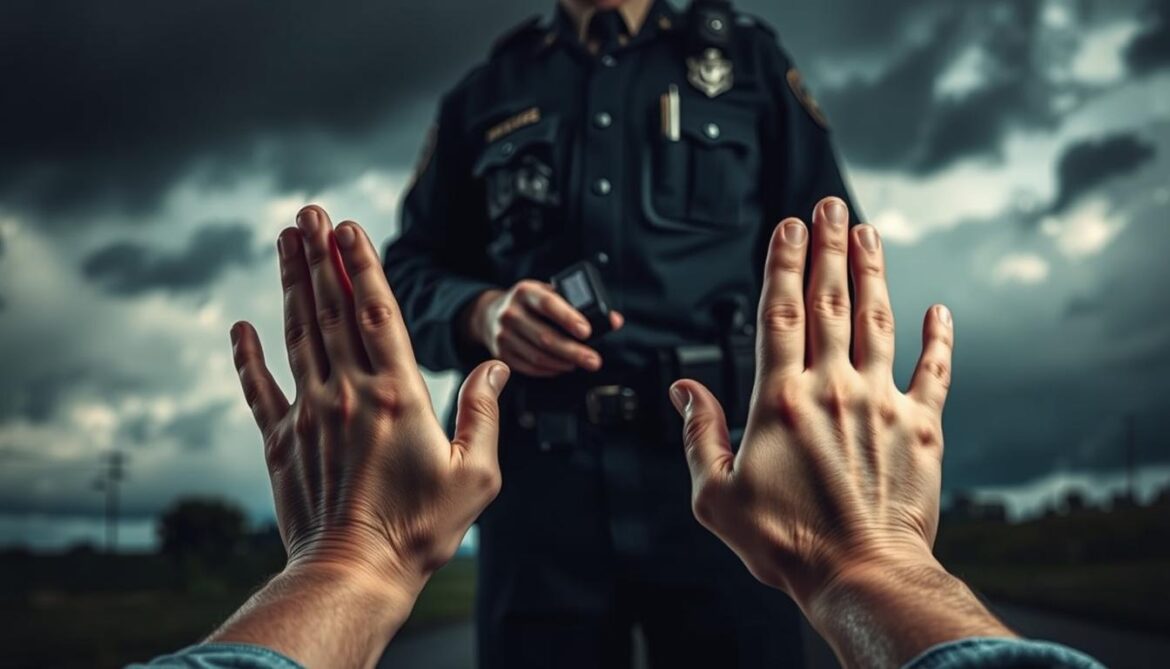Nearly 70,000 Canadians face impaired driving charges each year. Surprisingly, 40% of these cases involve people who refused breath samples. This refusal carries the same severe penalties as driving while intoxicated.
Under section 320.15(1) of the Criminal Code, not complying with a breath sample request is a serious offense. The law doesn’t differentiate between refusing or failing to provide an adequate sample when asked.
Canadian law treats breath test refusal with particular strictness. Your response to an officer’s demand is as significant as your actual blood alcohol content.
Officers can legally request a breath sample if they suspect impaired driving. Your reaction to this request is crucial. Without a legitimate excuse, refusing a sample can impact your criminal record and driving privileges.
It’s vital to understand your rights and obligations during roadside stops in Canada. The following sections will explain the legal framework and potential defenses for this situation.
Understanding Breath Demands in Canadian Law
Breath demands in Canadian law are crucial for drivers to understand. These legal mechanisms affect roadside interactions with law enforcement. As a driver in Canada, you’re subject to alcohol and drug testing laws.
These laws balance public safety with procedural protections. Every Canadian driver should know this legal framework. It impacts how police can test for impaired driving.
Legal Definition Under the Criminal Code
Canadian law defines breath demands as lawful requests by police for alcohol testing. These demands are legally binding. Refusing without a good reason is a criminal offense.
The Criminal Code’s Section 320.27 allows police to demand breath samples for alcohol testing. Section 320.28 covers oral fluid samples for drug detection.
Types of Breath Demands in Canada
Canada has two types of breath demands for enforcing impaired driving laws.
First is the roadside screening demand using Approved Screening Devices (ASDs). These portable tools provide quick results. They’re not definitive evidence, but can lead to further testing.
Second is the evidentiary breath demand at a police station. You must provide samples on advanced instruments like the Intoxilyzer. These results can be used in court.
When Police Can Make a Breath Demand
Police in Canada can make breath demands under specific legal circumstances. Knowing these helps you understand when officers act within their authority.
Reasonable Suspicion Standard
Police needed reasonable grounds to suspect alcohol in a driver’s body. This standard requires objective signs that would suggest alcohol presence.
Common signs include alcohol smell, slurred speech, or erratic driving. Officers must explain their specific observations. Without proper grounds, a demand could be challenged in court.
Mandatory Alcohol Screening Authority
Since 2018, Mandatory Alcohol Screening (MAS) allows breath tests without suspicion. Police can test any lawfully stopped driver.
This works like implied consent laws in other places. By having a license, you agree to future testing.
The Supreme Court supports this as a reasonable limit on rights. MAS applies during any lawful stop, even for minor issues. Refusing without good reason carries serious penalties.
The Criminal Code Provisions for Failing or Refusing a Breath Demand
Section 320.15 of the Criminal Code sets legal rules for failing or refusing a breath demand in Canada. These rules are key to impaired driving laws. They create serious consequences for not complying with breath testing requests.
This applies to routine traffic stops and sobriety checkpoints. The law aims to ensure road safety and deter impaired driving.
Section 320.15 of the Criminal Code
Section 320.15(1) states: “Everyone commits an offence who fails or refuses to comply with a demand.” This covers roadside screening tests and evidentiary breath testing. The law recognizes different scenarios, including accidents causing harm or death.
Elements of the Offense
For a conviction, the Crown must prove several key elements beyond doubt. You must have known about the lawful breath demand. Your actions resulted in no sample being provided.
You had no valid reason for not complying. The prosecution must show you knowingly chose not to comply.
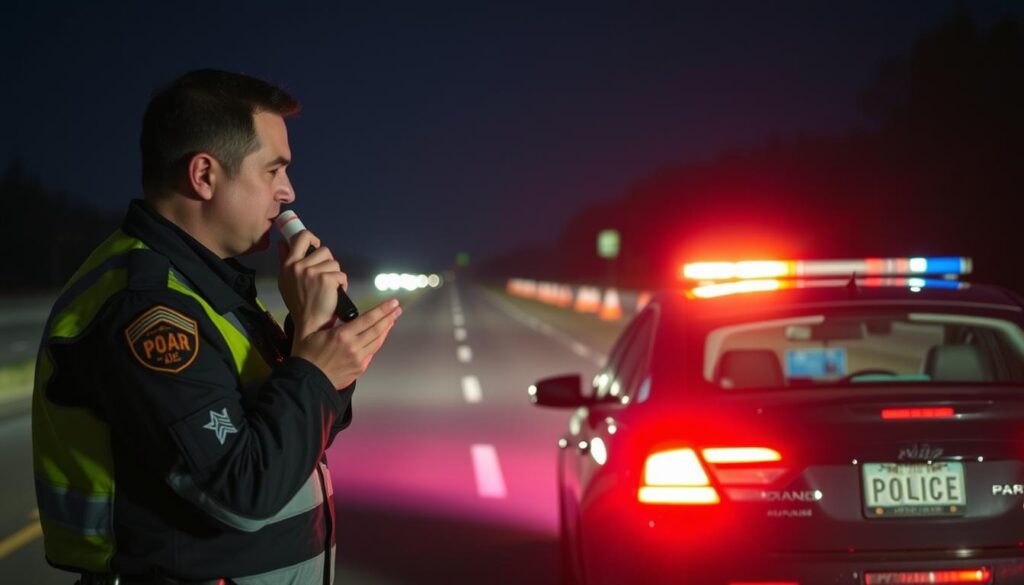
Distinction Between Failing and Refusing
The Criminal Code distinguishes between “failing” and “refusing” a breath demand. Both carry the same penalties. This distinction often becomes crucial in court proceedings and defense strategies.
What Constitutes a “Refusal”
A refusal is a clear choice not to provide a breath sample. This may include saying “I refuse” or turning away from the device.
It can also mean staying silent after multiple requests. Walking away from the testing area is another form of refusal.
What Constitutes a “Failure”
A failure involves situations where you seem to comply but don’t provide a proper sample. This might include not blowing hard enough into the device.
Not maintaining breath long enough is also a failure. Pretending to blow or inconsistent blowing patterns can prevent a reading.
| Aspect | Refusal | Failure | Legal Treatment |
|---|---|---|---|
| Intent | Usually clear and deliberate | May be deliberate or claimed as inability | Both treated as non-compliance |
| Evidence | Officer testimony of verbal/physical refusal | Device records showing incomplete samples | Both require police documentation |
| Defense Strategy | Focus on reasonable excuse | Often claims physical inability or device error | Both require proving reasonable excuse |
| Common Context | Often at sobriety checkpoints | Frequently after failed field sobriety test | Both occur during lawful police stops |
Courts view failing and refusing equally under the law. The focus is on whether police were prevented from getting evidence. How that prevention occurred doesn’t matter in legal terms.
Failing or Refusing a Breath Demand vs. Impaired Driving
Refusing a breath demand and impaired driving are separate legal violations in Canada’s Criminal Code. They have different elements that must be proven in court. Police often charge suspects with both offenses to increase conviction chances.
Key Legal Differences
For impaired driving, prosecutors must prove you were impaired while operating a vehicle. They can also show your blood alcohol concentration exceeded the legal limit of 0.08%.
For refusing a breath demand, prosecutors need to prove three things. First, an officer made a lawful demand. Second, you understood the demand. Third, you failed to comply without a reasonable excuse.
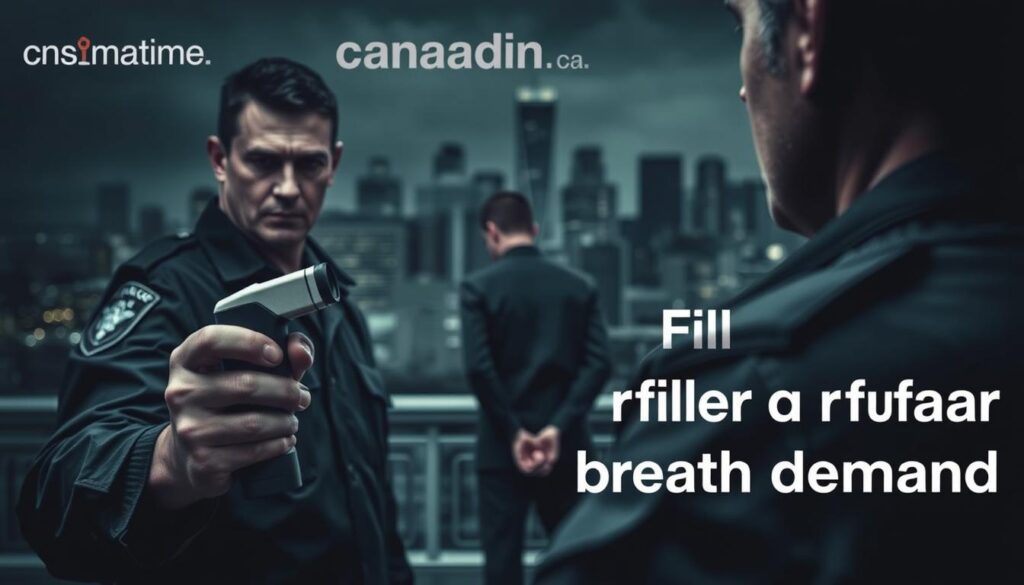
Evidentiary Considerations
Impaired driving cases rely on breath test results and physical signs of impairment. These can include slurred speech, poor coordination, or field sobriety test results.
Refusal cases focus on documenting that a proper demand was made. Evidence includes officer testimony and your response to the demand. Video evidence often plays a crucial role in these cases.
These differences create distinct defense strategies for each charge. Understanding the specific allegations against you is essential for building a strong defense.
Why Refusal Carries Similar Penalties
Canadian law imposes equally severe penalties for both offenses. This prevents drivers from refusing tests to avoid harsher impaired driving penalties. The similar breath demand consequences ensure strategic refusal doesn’t benefit the accused.
The “Consciousness of Guilt” Principle
The legal system sees refusal as a sign of guilt. It suggests you knew you were impaired and tried to avoid providing evidence.
Courts often view refusal as an attempt to obstruct justice. This explains why breath demand consequences are as serious as those for impaired driving.
Legal Consequences of Failing or Refusing a Breath Demand
Failing or refusing a breath demand in Canada leads to serious legal consequences. The Canadian legal system treats these offenses severely. They view them as attempts to evade justice in potential impaired driving situations.
Criminal Penalties and Sentencing
Criminal penalties for failing or refusing a breath demand are substantial. For a first-time offense, courts must impose a mandatory minimum fine of $2,000. This penalty reflects the seriousness of this violation in Canadian law.
A second conviction leads to much more severe consequences. You’ll face a mandatory minimum of 30 days imprisonment. Sentences can reach up to 10 years for aggravated circumstances.
Third and subsequent offenses carry a mandatory minimum of 120 days behind bars.

Mandatory Minimum Sentences
Breath demand refusals come with mandatory minimum sentences. These sentences restrict judicial discretion significantly. Even if a judge believes your circumstances warrant leniency, they’re bound by these statutory minimums.
These rigid sentencing requirements reflect Parliament’s determination to combat impaired driving. Courts have consistently upheld these minimums as constitutional despite challenges.
Impact on Your Criminal Record
A conviction results in a permanent criminal record unless you obtain a record suspension. This record can have far-reaching implications beyond immediate court-imposed penalties.
Border Crossing Implications
U.S. immigration authorities consider a breath demand refusal conviction a serious offense. It can make you inadmissible to the United States. Many Canadians are shocked when turned away at the border years after their conviction.
As recent cases have shown, refusal to comply with legal demands can have serious repercussions. These consequences apply across various contexts in the Canadian justice system.
Employment Consequences
The employment implications can be devastating. Many positions require driving as part of job duties. A breath demand refusal conviction typically triggers automatic license suspension under provincial regulations.
These suspensions generally range from one year for first offenses to five years for repeat offenders. Many employers conduct criminal background checks as part of their hiring process.
A conviction may disqualify you from roles requiring security clearances or professional licensing. Even existing employment can be jeopardized if your position requires a clean criminal record.
Administrative Penalties and Provincial Variations
Refusing a breath test in Canada triggers two types of consequences. These include criminal penalties under federal law and administrative sanctions that differ by province. Provincial penalties often affect your daily life more quickly than criminal charges.
Each province has its own administrative penalty system. This system starts right after you refuse a breath test. The Criminal Code applies across Canada, but provincial rules vary.
Immediate License Suspension Across Provinces
Refusing a breath test results in an immediate driver’s license suspension in all Canadian provinces. Your driver’s license is suspended on the spot. The length and terms of these suspensions differ by location.
Ontario enforces a 90-day roadside suspension. British Columbia imposes a 90-day ban with a 30-day vehicle impoundment. Saskatchewan has strict measures, with drivers facing an indefinite license suspension until criminal charges are resolved.
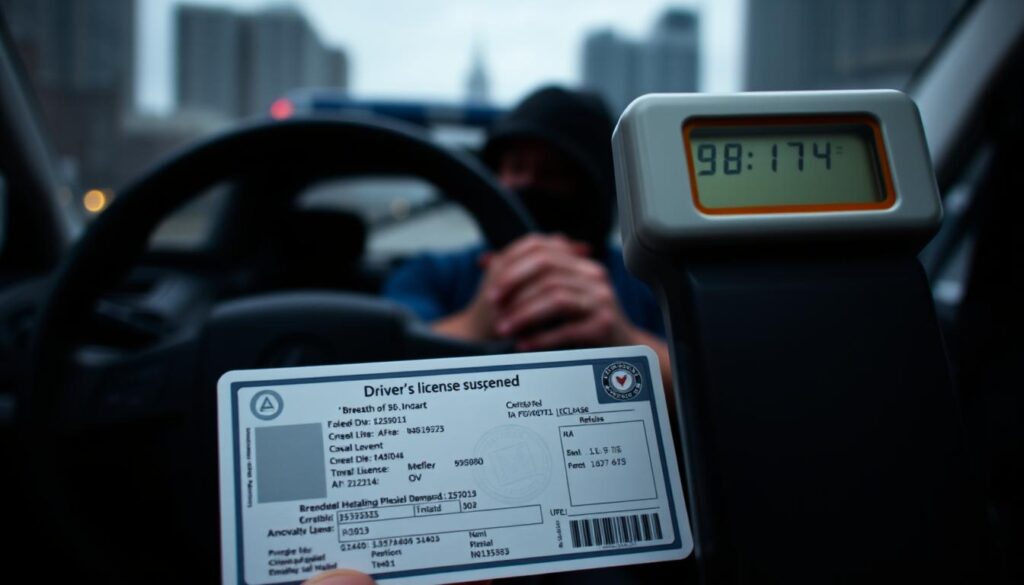
Alberta and Manitoba impose 90-day suspensions, followed by restricted driving privileges. These typically require using an ignition interlock device. Quebec’s approach includes a 90-day suspension and a mandatory assessment of driving behavior.
Vehicle Impoundment Regulations
Most provinces pair license suspensions with immediate vehicle impoundment for breath test refusals. Your car is taken right at the roadside, leaving you without transportation. You’re responsible for all related costs.
Saskatchewan has the longest impoundment period at 60 days. Other provinces typically range from 7 to 30 days. Impoundment costs include towing fees, daily storage charges, and administrative fees.
For a 30-day impoundment, these expenses can easily exceed $1,500. Towing fees usually cost $200-$400, while daily storage charges range from $20-$60.
Ignition Interlock Requirements
After a breath test refusal conviction, most provinces require an ignition interlock device in your vehicle. This device stops your car from starting unless you provide an alcohol-free breath sample. You must also give random samples while driving.
The length of mandatory interlock programs varies by province and prior offenses. First-time offenders typically face one-year requirements. Repeat offenders may need to use the device for three years or longer.
You’re responsible for all costs related to the interlock device. These include installation ($150-$300), monthly monitoring fees ($75-$150), and removal charges ($50-$100).
Insurance Premium Increases
Insurance penalties are often the most financially damaging long-term consequence of refusing a breath test. Insurance companies see breath test refusals as high-risk behavior. This often leads to premium increases of 100% to 300% for at least three years.
Saskatchewan has structured insurance penalties. Drivers move to -20 or minimum -10 on Safe Driver Recognition Points. They also face an additional $2,250 financial penalty.
Some drivers can’t get coverage from regular insurance providers after a breath test refusal conviction. They’re forced into high-risk insurance pools with annual premiums exceeding $10,000. This financial burden often lasts long after other penalties end.
| Province | Immediate Suspension | Vehicle Impoundment | Interlock Requirement | License Disqualification |
|---|---|---|---|---|
| Ontario | 90 days | 7 days | 1-3 years | 1-3 years |
| British Columbia | 90 days | 30 days | 1-2 years | 1-3 years |
| Alberta | 90 days | 3 days | 1 year minimum | 1-5 years |
| Saskatchewan | Indefinite until resolution | 60 days | 1-5 years | 1-5 years |
| Manitoba | 90 days | 30 days | 1 year minimum | 1-5 years |
Provincial Reinstatement Programs
After a breath test refusal conviction, you must complete provincial reinstatement requirements to drive legally again. These typically include mandatory education programs about impaired driving. Programs can range from one-day workshops to multi-week courses costing $200-$600.
Many provinces require substance abuse assessments by healthcare professionals. These determine if you have alcohol dependency issues. Depending on the results, you might need to complete treatment programs before regaining your license.
The final step in reinstatement involves paying substantial administrative fees. These fees range from $100 to over $1,000, depending on your province and offense history. The total cost of license reinstatement often exceeds $2,000.
Your Rights When Facing a Breath Demand
Knowing your rights is crucial when facing a breath demand from law enforcement. This legal scenario can greatly impact your case’s outcome. Understanding these rights helps protect your legal interests in this challenging situation.
Right to Legal Counsel
Your right to legal counsel depends on the type of breath test requested. For roadside screening tests, you do not have the right to consult a lawyer first. These are considered screening tools, not evidentiary procedures.
For evidentiary breath tests at police stations, you have the right to speak with a lawyer first. This right also applies to blood sample demands. Officers must inform you of this right.
They must provide a reasonable opportunity to contact legal counsel before proceeding with the DUI breath test.
Limitations on Police Powers
Police officers must follow specific legal boundaries when conducting breath demands. They need reasonable grounds to suspect alcohol in your body for an ASD demand. For evidentiary breath demands, they must believe you’ve committed an impaired driving offense.

Officers must use properly calibrated and approved testing devices under Canadian law. Testing must occur within specified timeframes, typically within two hours of driving.
When You Can Legally Refuse
Refusing a breath demand usually has serious consequences. However, there are limited circumstances when refusal may be legally justified.
Medical Exemptions
People with severe respiratory conditions may have valid grounds for refusal. These include severe asthma, COPD, or lung disease. In such cases, alternative testing methods like blood samples may be needed.
Procedural Requirements for Police
Police must follow specific protocols for a valid breath demand. They must clearly communicate the demand and explain refusal consequences. The testing must also occur within legal timeframes.
If officers fail to meet these requirements, you may challenge the demand’s validity.
“The right to counsel is a fundamental safeguard that ensures individuals understand their legal position before providing potentially incriminating evidence through breath samples.”
Understanding these rights and limitations is crucial for challenging a breath demand’s legality in court. Specific circumstances often require professional interpretation of these legal protections.
Common Defenses to Failing or Refusing a Breath Demand
Charges for failing or refusing a breath demand can be defended. Proper defense strategies often lead to withdrawn charges or not guilty verdicts. Knowing these strategies could make the difference between conviction and acquittal.
Reasonable Excuse Defense
The “reasonable excuse” argument is a common defense. It admits not providing a sample but claims a valid reason. Courts have accepted several legitimate excuses.
These include physical inability, confusion about the process, and fear of medical harm. However, courts usually reject excuses like wanting a specific lawyer or distrusting equipment.
Unlike field sobriety tests, breath demands require objective compliance under Canada’s implied consent law.
Charter Violations
Violations of your Charter rights provide strong defense grounds. If police disregarded your rights, evidence may be excluded or charges dismissed. Common violations include denial of counsel and unreasonable search.
Other violations are failure to explain detention reasons and using excessive force during testing.

Medical Conditions as Defense
Some medical conditions can make providing a breath sample impossible. These include severe asthma, COPD, panic disorders, and mouth injuries. You’ll need medical documentation and possibly expert testimony for this defense.
Courts distinguish between actual inability and unwillingness to provide a sample.
Procedural Errors by Law Enforcement
Police must follow strict protocols for breath tests. Any deviation can form a strong defense basis. Common errors include improper demand formulation and using unapproved devices.
Other errors are failing to observe continuously before testing and unreasonable delays between demand and testing.
Important Case Law Precedents
Landmark cases have shaped breath demand charge defenses in Canada. R. v. Thomsen set roadside testing guidelines. R. v. Grant established Charter violation standards.
R. v. Bernshaw addressed breath testing device reliability requirements. A skilled lawyer can spot these issues even in seemingly indefensible cases. Technical compliance is crucial for the Crown to secure a conviction.
The Breath Testing Process in Canada
Understanding the breath testing process in Canada can protect your rights during a police stop. The procedure follows specific protocols to determine if a driver exceeds the legal blood alcohol concentration limit. This approach ensures consistent enforcement and provides certain protections for drivers.
What Happens During a Traffic Stop
At a stop or sobriety checkpoint, officers look for signs of impairment. These include alcohol smell, slurred speech, and poor coordination. Officers may ask if you’ve consumed alcohol recently.
Your admission of drinking, combined with observable signs, can justify a breath demand. Police can legally detain you to obtain a breath sample if they have reasonable suspicion.
Approved Screening Devices
The first test uses an Approved Screening Device (ASD). These portable devices provide preliminary readings but aren’t used as evidence in court. They simply establish grounds for further testing.
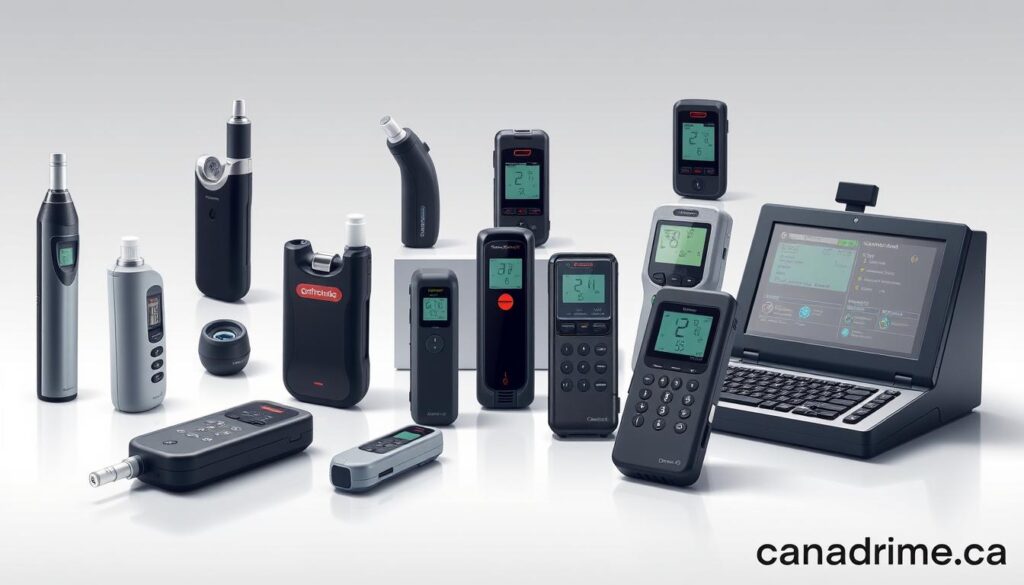
These devices require you to blow steadily into a mouthpiece. Results are typically displayed as “pass,” “warn,” or “fail” rather than specific numerical readings.
Evidentiary Breath Testing Procedures
If you fail the roadside test, you’ll be arrested and taken to a police station. More sophisticated testing occurs using approved instruments like the Intoxilyzer 8000C or 9000.
At the station, qualified breath technicians follow strict protocols. You’ll be observed for 15-20 minutes to ensure mouth alcohol doesn’t affect results.
At least two samples will be taken, separated by at least 15 minutes. The lower of the two readings is typically used as evidence.
These tests provide precise numerical readings of your blood alcohol concentration. The legal limit in Canada is 80 milligrams of alcohol per 100 milliliters of blood (0.08%).
Blood Testing Alternatives
Sometimes, breath samples cannot be obtained. This might occur if you have a medical condition or have been in an accident. In these cases, police may demand a blood sample instead.
Only qualified medical professionals can draw blood for this purpose. The procedure must be conducted under police demand. The blood sample is then analyzed in a laboratory.
Calibration and Maintenance Requirements
For breath test results to be valid in court, the equipment must be properly maintained. Canadian law requires regular calibration checks and detailed record keeping.
Proper certification of technicians and temperature control during testing are also mandatory. These requirements exist because improper calibration can lead to inaccurate results.
Defense lawyers often challenge breath test evidence by examining maintenance records. If proper procedures weren’t followed, the test results may be deemed inadmissible in court.
Conclusion: Navigating Breath Demand Situations
Every driver should know their legal obligations for breath demands in Canada. Unlike other criminal situations, lawfully issued breath demands require your compliance under the Criminal Code.
Failing or refusing a breath demand carries penalties equal to impaired driving. These include criminal records, minimum $2,000 fines, driving bans, and higher insurance costs.
It’s best to comply with lawful demands while speaking to a lawyer first. If you have a medical condition preventing sample provision, explain this clearly to officers.
If you think a breath demand was unlawful, challenge it in court with legal help. Procedural errors or Charter violations may provide valid defenses.
Canada has strict impaired driving laws. Knowing your obligations and rights helps protect you in these serious situations.

